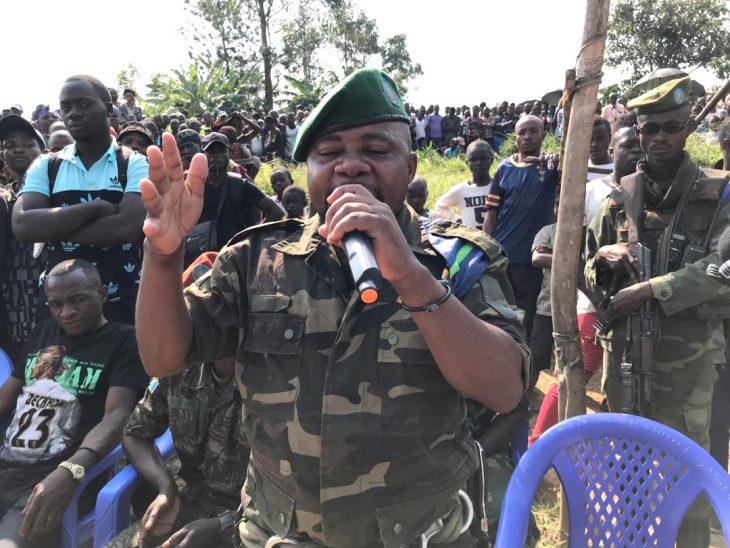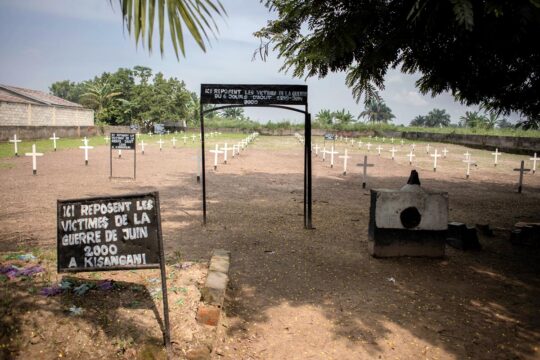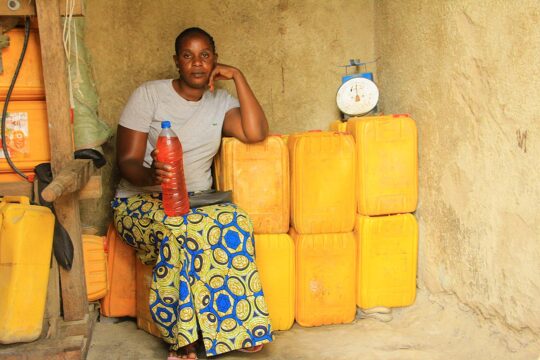"Warrant and order that Shimirayi Mwisha Guidon be arrested wherever he is, taken into custody and handed over to the competent judicial authorities." This is how the arrest warrant signed on June 7, 2019 in Goma by Colonel Ndaka Mbwedi Hyppolite, Chief Prosecutor at the Operational Military Court of North Kivu, reads. By this act, the Congolese military justice system decided to prosecute the self-proclaimed General Shimirayi Mwisha Guidon, head of the Nduma Defense of Congo-Renovated (NDC-R), a feared militia active in the eastern Democratic Republic of Congo (DRC).
Guidon is accused of "participation in an insurrectional movement", "war crimes by child recruitment" and "crimes against humanity by rape". Crimes that were committed, according to the arrest warrant, since 2009 in several localities in the territories of Walikale, Masisi and Lubero, where Guidon was at the helm of NDC-R.
The logic of the arrest warrant
According to Congolese justice, the crimes for which this militia leader is being hunted were committed in two stages. First, between 2009 and 2014, when Shimirayi Mwisha Guidon was the right-hand man of Tabo Ntaberi Sheka, a former warlord, founder of NDC who has been faced with a military court in North Kivu since November 2018 for crimes against humanity. Then, from 2014 to the present day, while Guidon was in control of the NDC-R, a dissident faction of Sheka’s NDC. "At first, it was a single movement, the NDC, led by Sheka, with Guidon as its second commander. But the latter had rebelled to form the dissident NDC-Renovated branch. It is currently operational in Walikale, Masisi and Lubero where their men continue to plunge families into mourning. For example, here, only 10 kilometres from Masisi-centre, they rape women and recruit children under the age of 18," says Augustin Ndagisimana, vice-president of civil society in Masisi territory.
According to the Kivu Security Barometer, a joint project of the Groupe d'études sur le Congo and Human Rights Watch, NDC-R is one of the most formidable of the 132 armed groups operating in eastern Congo. "Since the beginning of 2019, we have seen an increase in the power of NDC-Renovated. Beyond Walikale, Masisi and Lubero, unverified information indicates the presence of NDC-Renovated elements also in Beni territory, on the Butembo-Beni axis. It is one of the few local militias with this operational capacity," says Jackson Bwahasa, a researcher in conflict dynamics at the Centre for Applied Legal Studies at the Graben Catholic University. And "since the beginning of the year, nearly 300 allegations of conflict-related sexual violence have been reported in Masisi territory. The Joint Human Rights Office verified 111 cases between January and April, half of which were attributable to the NDC-R," said Florence Marchal, spokesperson for the United Nations Mission in Congo (Monusco), on 26 June.
When the arrest warrant was announced, the civil society in North Kivu first welcomed it, speaking of an action that would alleviate the suffering of the population. "We encourage this approach because impunity cannot be encouraged under any circumstances. All those who commit crimes must be held accountable before the courts. When it comes to Guidon, an arrest warrant against him makes sense," says Edgard Mateso, vice-president of civil society in North Kivu.
The Monusco also described the arrest warrant as a "positive development for the security of the province and the fight against impunity".
Justice versus Demobilization
Yet analysts, experts and human rights activists remain cautious. "Certainly the action is good, but the context and circumstances of the arrest warrant are worrying us," says Edgard Mateso. In the same line, Member of Parliament Prince Kihangi, Chairman of the Political, Security, Administrative and Legal Commission of the Provincial Assembly (Regional Parliament) of North Kivu, more bluntly describes the military justice process as inappropriate and suspicious.
First, the mandate was launched at a time when the Provincial Assembly had just begun talks with militia leaders, including Shimirayi Mwisha Guidon, to try to obtain their surrender in order to pacify a region which has been torn apart for more than 20 years by armed conflicts. On 21 May, the provincial governments of North and South Kivu had established an inter-provincial commission to support the sensitization, disarmament, demobilization and community reintegration of militiamen, including those of NDC-R. "We were just a stone's throw from getting a disarmament agreement on NDC-Renovated. Discussions were progressing very well with the committee of which I am the chairman. We were unpleasantly surprised to learn that an arrest warrant had just been issued against him. This peace negotiation had to be given a chance," says Prince Kihangi, also a lawyer at the Goma Bar.
"We think there are people who don't want Guidon to surrender, fearing that he will make big revelations about their involvement in the commission of the crimes," he adds. Such suspicions are shared by researcher Jackson Bwahasa. "It is a secret known to all: for some time, the Congolese army [FARDC] had been using NDC-Renovated to fight Rwandan Hutu rebels from the Forces démocratiques pour la libération du Rwanda (FDLR) and other local militias, including May-May Mazembe," Bwahasa explains. "NDC-renovated are therefore the FARDC's allies. Several reports have revealed the support of some Congolese army officers to Guidon. These officers would therefore not be happy with Guidon's surrender to the authorities of the new regime" of President Felix Tshisekedi.
In their December 2018 report, the United Nations Group of Experts on the DRC also reported clear collaboration between the NDR-R and the Congolese army, particularly in Masisi, where the Guidon group had just set up its headquarters.
Will of justice or political deception?
These analysts therefore doubt the good intention of this arrest warrant. "Normally such legal action aims to prevent the commission of other crimes, by punishing the perpetrators. We are not in favour of impunity. But we think that this mandate will rather encourage the commission of new crimes that could be circumscribed, because the action has just radicalized Guidon. He feels betrayed by his former allies. He no longer takes telephone calls from the members of the commission who were negotiating his surrender, and on the rare occasions that he dares to pick up the phone, he passes us instead his collaborators who attack us, arguing that with this arrest warrant, they have understood that we rather wanted, through our surrender negotiation, to trap their leader. They promise us fierce resistance," said Prince Kihangi, who has been elected in Walikale, one of Guidon's strongholds.
"We have just learned that Guidon is already rapidly recruiting women and children to use them as a human shield in the event of any attack to stop him. If this is the case, the detractors' move would be successful," says Bwahasa, since he will remain entrenched and silent about what he knows. "So don't be surprised that this arrest warrant remains a dead letter like the one issued [in 2012 by the International Criminal Court] against the leader of the FDLR, Sylvestre Mudacumura. These are political approaches that do not aim to stop them, but rather to move them away from the "parlor" of truth and justice. As proof: after the issuance of this arrest warrant, no offensive is launched against these rebels," said Kihangi. "As long as it is possible to solve the problem peacefully, we must dare to do so. As it stands, negotiation for surrender is one of the solutions that saves human lives, which arrest warrants cannot do. Justice must know that, in order to stop crimes, targeting warlords is not the only option. In my native Walikale, Sheka surrendered, but no action, either on the army side or on the justice side, let alone on the political side [disarming, demobilizing and reintegrating] has been taken against her troops left in the bush. As a result, someone else took control of the NDC and crimes continue to be committed," Kihangi says.
His fellow MP, lawyer Jean-Paul Lumbulumbu, also vice-president of the Provincial Assembly of North Kivu, petitioned the new governor of North Kivu on 1 July, asking him to avoid radicalising armed groups. "First, there is a clear willingness on the part of many combatants to leave armed groups. About 600 fighters are now reportedly ready to surrender. We mustn't frighten them. Instead, they should be referred to a community awareness, disarmament, demobilization and reintegration commission that must urgently be made operational. An interprovincial legal framework establishing this commission already exists. And it enjoys the support of the current head of state, who wants the immediate eradication of armed groups. Partners are now available to support [this task]. You have to take advantage of these opportunities," he told Justiceinfo.net.





